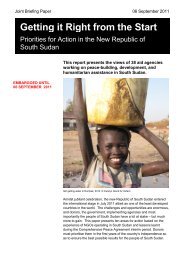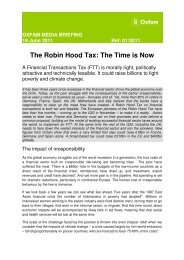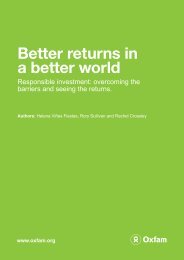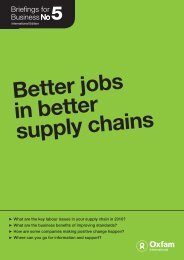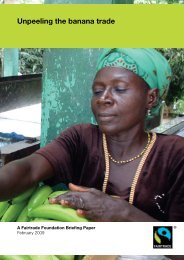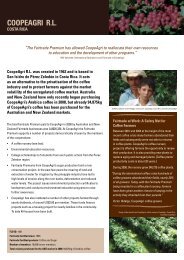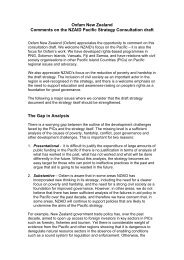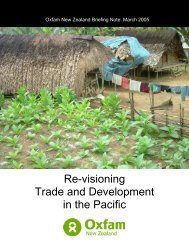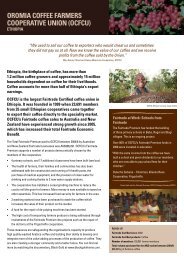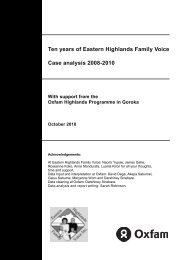Growing a Better Future - Oxfam International
Growing a Better Future - Oxfam International
Growing a Better Future - Oxfam International
- No tags were found...
You also want an ePaper? Increase the reach of your titles
YUMPU automatically turns print PDFs into web optimized ePapers that Google loves.
Box 1: A new breed of land investorWhere there is scarcity, there is opportunity. Andfinancial investors are quick to turn opportunity intoprofit. Numerous hedge funds, private equity funds,sovereign wealth funds and institutional investors arenow buying up farmland in developing countries. Oneis Emergent Asset Management, currently enjoyingthe arbitrage opportunity presented by ‘very, veryinexpensive’ land values in sub-Saharan Africa. 41Emergent points out that Zambian land, though someof the most expensive in sub-Saharan Africa, is stillone-eighth the price of similar land in Argentina orBrazil, and less than a twentieth of that in Germany.Emergent assumes that land will generate strongreturns as prices rise – in part because of increasingdemand for land from the food powers of Braziland China. 42One of Emergent’s stated strategies is to identifypoorly managed or failing farms and buy them up atdistressed prices, then turn them around in order toboost returns. Rapidly appreciating land pricesprovide a ‘backstop’ should this risky strategy fail.Agricultural investment is desperately needed. AndEmergent argues that it is not simply building up landbanks – it also invests to increase productivity andbrings in new techniques and technologies, as well asmaking ‘social investments’ in schools, hospitals andhousing. But the risk remains that some investors willbe interested only in the easy return on land, ratherthan the trickier business of growing food.Climate changingClimate change poses a grave threat to food production.First, it will apply a further brake on yield growth.Estimates suggest that rice yields may decline by 10 percent for each 1°C rise in dry-growing-season minimumtemperatures. 43 Modelling has found that countries insub-Saharan Africa could experience catastrophicdeclines in yield of 20–30 per cent by 2080, rising ashigh as 50 per cent in Sudan and Senegal. 44Second, it will increase the frequency and severity ofextreme weather events such as heatwaves, droughtsand floods which can wipe out harvests at a stroke.Meanwhile, creeping, insidious changes in the seasons,such as longer, hotter dry periods, shorter growingseasons, and unpredictable rainfall patterns arebewildering poor farmers, making it harder and harderfor them to know when best to sow, cultivate, and harvesttheir crops. 45For people without the incomes, savings, access tohealthcare or social insurance enjoyed in industrializedcountries, shocks from climatic disasters or shiftingseasons often force them to go without food, sell offassets critical to their livelihoods, or take their childrenout of school. Short-term coping strategies can havelong-term consequences, causing a downward spiralof deeper poverty and greater vulnerability.Despite the scale and urgency of the challenge,governments have failed to take adequate action toreduce emissions, collectively or individually. Insteadthey have listened to their industrial lobbies – the smallnumber of companies that stand to lose from a transitiontowards a sustainable future from which the rest of uswould gain (see Box 2).Box 2: Dirty industry and grubby lobbyingLobbying from dirty industries has kept Europe lockedinto low ambition on reducing its greenhouse gasemissions, marginalizing its influence in negotiationsand preventing a transition to a low-carbon economy.Others, meanwhile, race past – most notably China,now the world’s biggest sovereign investor inrenewables. 46 Some of the most intense lobbyingcomes from steel, oil and gas, chemicals, and papercompanies and the associations that speak on theirbehalf, 47 as well as from wider cross-sectoral umbrellagroups, most depressingly of all BusinessEurope –the general European employers’ association – towhich most major companies that profess deepconcern about climate change belong. These facelessassociations have low public profiles, allowingsupposedly ‘responsible’ companies to keep theirhands clean.Companies not only lobby against greater climateambition, they also lobby to capture regulation forthemselves. For example, ArcelorMittal, the world’slargest privately owned steel company, has lobbied tosecure free allowances under the EU EmissionsTrading Scheme (ETS). The company has profitednicely from its lobbying, ending up with allowances tospare – potentially allowing it to increase its emissionsin the future. All these surplus allowances depress thecarbon price and remove the incentives for investmentin clean technologies that the carbon market wasdesigned to provide. By 2012 ArcelorMittal couldpotentially make over €1bn from these freehandouts, 48 turning on its head the principle at theheart of the ETS – that the polluter pays.<strong>Growing</strong> a <strong>Better</strong> <strong>Future</strong>Chapter 2: The age of crisis:a skewed and failing system19



